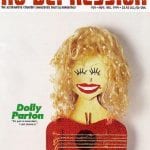Mulehead – Not quitting their day jobs
“If you really want to do this right,” says Kevin Kerby, “first you really have to make a lot of money, and then you can do whatever you want. I just cut out the money part.”
Mostly what Kerby wants to do these days revolves around the band he calls Mulehead, though he’s still chewing at a degree in journalism and painting neo-outsider portraits. Little Rock’s the kind of place where such diversification is wise, music is better off kept a hobby, and an understanding wife is a necessity.
Well, most of America’s like that, isn’t it?
Reared in Texas with Slobberbone’s Brent Best, Kerby is too deeply infected with the need to write songs to treat his music simply as a hobby, and too experienced to hope for more. He played guitar in the unfortunately named Ho-Hum, who released their first album on Universal in 1996. Mulehead bassist Brent Labeau was in the Gunbunnies, who managed a long-player for Virgin in 1990 (though Labeau wasn’t on it). Those get to be tough lessons.
Ho-Hum was and is a foil for the songwriting brothers Bryan. Mulehead began, Kerby says, “as my songs and some friends playin’ ’em. Which, I thought, is what Mulehead was gonna be.”
That original impulse and lineup produced 1998’s Never Again, a largely private meditation on the unresolved tension between the rock of his adulthood and the bedrock Christianity of his upbringing. Amid the simmering stew of an adroit Southern bar band, Never Again revealed a surprisingly supple and subtle songwriter, a bit like the V-Roys’ Scott Miller. The new The Gospel Accordion II, recorded with an entirely different band (Labeau, brewmaster Dave Raymond on guitar, Geoff Curran on drums), is a more public affirmation of music’s tangible pleasures.
“I got some rest,” Kerby explains. “A lot of why I left [Ho-Hum] was because I was just tired. I would have to get up on a Wednesday morning and know I was going to be gone for a month, and I was burned out on traveling. Now, I have incorporated music into my normal life.”
Which isn’t to say Accordion II has entirely resolved the tug between Kerby’s Church of Christ upbringing and his fondness for, as the opening song puts it, “Cheap Red Wine”. And so for every “When The Dope Ran Out (So Did She)” there’s the counterbalance of “Pilate” (in which the Roman governor asks why he’s spending eternity in hell) and the sweet “Lullaby For Catfish”, written for Labeau’s new son.
So Mulehead’s members play weekends within van distance of Little Rock, work during the week, and ask for no more, thank you. “I would only do it…” he begins, pauses. “Oh, shit. No, not really.”




